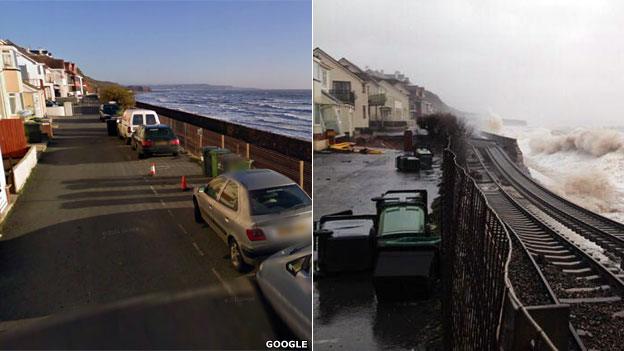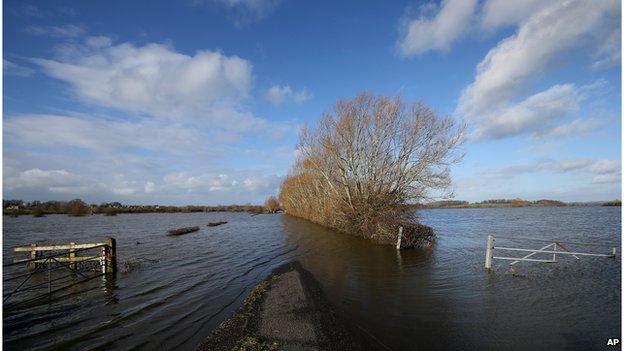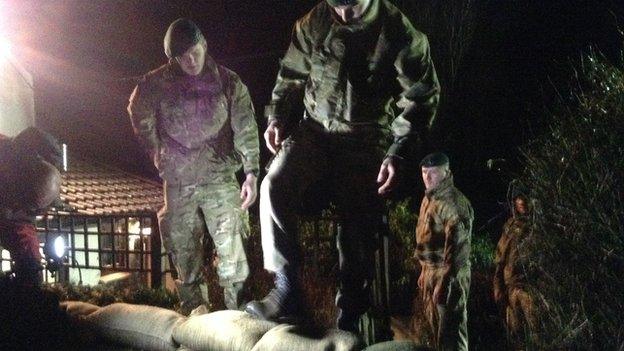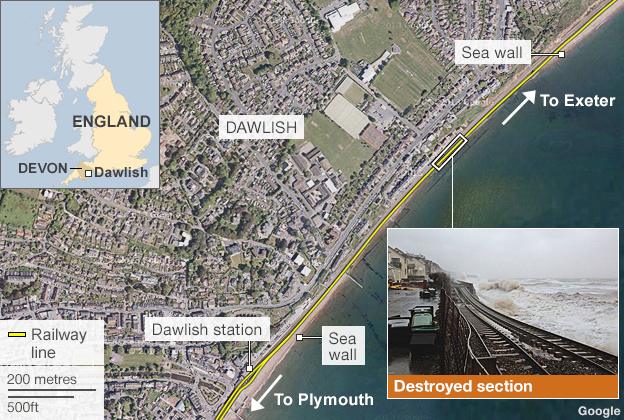Prime minister pledges to get flood-hit UK back on the move
- Published
Scenes of stormy seas in the South West of England
The prime minister has promised to do "everything possible" to help people affected by the storms that continue to devastate parts of the UK.
South-west England has been worst hit, with many homes still flooded and part of a key railway line destroyed.
Environment Agency chairman Lord Smith is to visit the Somerset Levels on Friday for the first time since the flooding began.
The military are already there to help people living in the badly hit region.
The Ministry of Defence has deployed about 40 Royal Marines from 40 Commando in Taunton to the Somerset Levels to help protect property and people and to provide more military support where necessary.
Earlier the government pledged an extra £30m for flood repairs and maintenance as the prime minister defended the government's response to the storms.
After chairing another meeting of the Cobra emergency committee, David Cameron pledged continuing assistance to those who had suffered the most.
He said: "I want to reassure everyone affected by these terrible storms that we will continue to keep up our urgent response and help get them back on the move."
He said more pumps would be sent to clear roads, and he said army engineers were working with National Rail on options to shore up the section of the key railway line between Devon and Cornwall, which was badly damaged in Wednesday's storms.
Earlier, when asked whether visiting flood-hit Somerset would be more useful than talking in London, Mr Cameron said: "It was because of Cobra that we got extra pumps down to Somerset. It was because of Cobra that I forced through the extra £100m of funding.
"It's because of Cobra that the army is available to help in Somerset. If there's anything that they can do to help, they will do."

The storm caused huge damage to the railway line in Dawlish, which is expected to take weeks to fix

Residents of the Somerset Levels have been urged to evacuate as the area braces for more flooding

Royal Marines are helping reinforce defences in the Somerset Levels with sandbags
Some residents in the Somerset Levels have heeded warnings to evacuate their homes amid fears that flood defences could be overwhelmed, but others have remained, apparently prepared to risk the consequences in order to protect their properties from looters.
Somerset County Council said the marines would support its own teams, reinforcing banks with sand bags and helping people move their belongings.
In other developments:
Some people living on the Somerset Levels have evacuated their homes while a rest centre has been set up in Bridgwater for evacuees there
A clear-up operation in Wales is under way ahead of the next predicted storms over the coming days
A 150-year-old pine tree has been blown over on to graves in Warminster, Wiltshire.
Communities Secretary Eric Pickles told MPs the government would carry out a "rapid review of the additional work needed to restore our flood defences and maintain them".

The extra £30m - on top of the £100m announced by Mr Cameron on Wednesday - would "cover costs incurred during the current emergency response and recovery, as well as essential repairs to ensure that defences are maintained", said Mr Pickles, who was standing in for Environment Secretary Owen Paterson, who is to have emergency eye surgery.
He also said 42 new flood defence schemes, external were planned for 2014/15.
But UKIP, which dismissed the extra spending as "far too little, far too late", called on the government to channel part of its foreign aid budget into helping those worst hit by the flooding.
It is urging the government to suspend payments from the £11bn annual budget and divert them "on a month by month basis" to areas in most need of repairs to storm-damaged property, renewal of flood defences and restoration of transport links.
Earlier, Transport Secretary Patrick McLoughlin told MPs he would review alternative rail routes to south-west England after the storm caused massive damage at Dawlish to the main railway between Devon and Cornwall.
Cost of destruction
Robin Gisby, of Network Rail, told BBC Radio 4's Today programme it would take "several weeks" to fix the line, which is regarded as a vital transport link between the region and the rest of the country.
Limited services were running between Plymouth and Penzance, with rail replacement services bridging the gap.
Tim Jones, from the Devon and Cornwall Business Council, said the destruction of the line would cost the region's economy between £1m and £2m a day.
Business leaders in Devon and Cornwall are worried that the destruction of the line will cost the local economy millions of pounds.
'No sign of an end'
The Met Office has issued severe weather warnings for rain, external in parts of southern England and south Wales, and two severe flood warnings, external on the Somerset Levels.
The amber warnings - meaning "be prepared" - for rain in parts of southern England, and yellow severe weather warnings - "be aware" - for areas including south-west England and south Wales - are valid until Saturday night.
The Environment Agency (EA) has two severe flood warnings, external - meaning "danger to life" - in Somerset, at Salt Moor and North Moor including Moorland, and at the A361 East Lyng to Burrowbridge.
At 22:00 GMT there were more than 90 flood warnings in England and Wales and 270 flood alerts.
In Scotland, there were four flood warnings, external and two flood alerts in place, the Scottish Environment Protection Agency said.
The EA said a total of 413 properties remained flooded in England, including 40 in Somerset, where 65 square kilometres of land (25 square miles) was under water.
Forecasters said there could be 20mm-40mm (0.8in-1.6in) of rain falling on saturated ground on Thursday, with further bouts of rain to come into the weekend.
BBC weather presenter Peter Gibbs said gusts of up to 70mph were expected during the next round of storms, due to hit the South West on Friday night, with the risk of even stronger gusts on Saturday night.
"There is no sign of an end to this unsettled weather right into next week," he said.
Electricity supplies have been restored to more than 1,700 customers in south-west England, who had been without power.
Despite the problems expected by businesses, the managing director of St Austell Brewery, James Staughton, said of the region: "We are very resilient, we are very open for business and I'm sure we'll find a way round it, but we need a lot of government support to make it happen."
